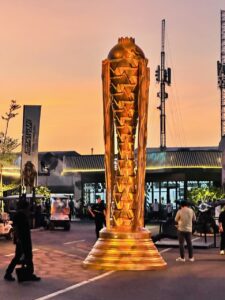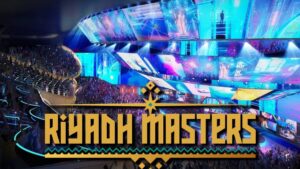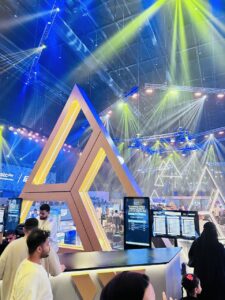
Esports World Cup Dota 2 2025: A Pinnacle of Competitive Gaming in Riyadh
The Esports World Cup (EWC) 2025, held in Riyadh, Saudi Arabia from July 8 to August 24, 2025, marked the second edition of this global multi-title esports extravaganza, rebranded and expanded from the Gamers8 series. Among its 25 featured titles, the Dota 2 tournament stood out as a flagship event, serving as the culminating championship of the third season of the ESL Pro Tour (EPT). Running from July 8 to July 19, 2025, the Dota 2 competition brought together 16 of the world’s top teams to vie for a $3,000,000 USD prize pool and crucial points toward the EWC Club Championship. With defending champions Gaimin Gladiators facing off against formidable contenders like Team Spirit, PARIVISION, and Team Falcons, the tournament delivered high-stakes drama, jaw-dropping plays, and a showcase of Dota 2’s enduring competitive legacy. This article explores the tournament’s structure, teams, standout moments, and broader impact, cementing its place as a defining moment in esports history.
 A Prestigious Stage for Dota 2
A Prestigious Stage for Dota 2
The Dota 2 Esports World Cup 2025, hosted by the Esports World Cup Foundation (EWCF) and ESL FACEIT Group, replaced the Riyadh Masters as the EPT’s final championship. Held at Boulevard Riyadh City, the tournament unfolded over two weeks, featuring 16 elite teams competing in a LAN setting for a $3,000,000 prize pool—one of the largest in Dota 2’s competitive calendar. The event also contributed to the EWC Club Championship, where organizations earned points across multiple titles for a separate $27,000,000 prize pool, with the top club securing $7,000,000.
The tournament was structured in three distinct phases, designed to balance fairness and intensity:
- Group Stage (July 8–11): The 16 teams were divided into four groups of four, competing in a round-robin format with best-of-two (Bo2) series. The top team from each group advanced directly to the Playoffs, while the second-placed teams entered the Elimination Phase’s second round, and the third- and fourth-placed teams started in the first round of the Elimination Phase. This format ensured every team had a chance to prove their mettle while reducing the impact of random outcomes.
- Elimination Phase (July 12–13): A gauntlet bracket pitted the 12 non-top teams against each other in best-of-three (Bo3) series. Third- and fourth-placed teams from the Group Stage faced off in Round 1, with winners advancing to Round 2 to challenge second-placed teams. The top four teams from this phase joined the Group Stage winners in the Playoffs. All matches in this phase ended in decisive 2-0 sweeps, highlighting the skill gap between top and bottom teams.
- Playoffs (July 15–19): The final eight teams competed in a single-elimination bracket, culminating in a grand final and a third-place match. This high-stakes format meant one loss spelled elimination, delivering intense matches that showcased Dota 2’s strategic depth. The tournament likely used a sub-patch of update 7.39, ensuring competitive balance and familiarity for players.
Matches were streamed live on the EWC’s official Twitch and YouTube channels, with VODs and highlights available post-event, making the tournament accessible to a global audience. The event’s timing, just before The International 2025(September 4–14 in Hamburg), positioned it as a critical proving ground for teams gearing up for Dota 2’s biggest stage.
 Prize Pool and Club Championship
Prize Pool and Club Championship
The $3,000,000 prize pool was distributed among the top teams, with the champion earning $1,000,000 and an additional $10,000 MVP bonus. The Club Championship added another layer of competition, awarding 3550 points to the winning organization, contributing to their overall EWC ranking. To win the Club Championship, an organization needed to place in the top eight in at least two titles and secure first place in at least one, making Dota 2’s points critical for clubs like Team Falcons, NAVI, and Team Liquid.
Participating Teams and Qualification
The Elite 16
The 16 teams were selected through a mix of direct invitations and regional qualifiers, reflecting Dota 2’s global competitive scene:
- Direct Invites: Eight teams earned spots based on their EPT Leaderboard rankings as of June 1, 2025. These included powerhouses like PARIVISION (24,745 points), BetBoom Team (15,760), and Team Spirit, who dominated the season with victories at DreamLeague Season 25. Defending champions Gaimin Gladiators secured an automatic invite after winning the 2024 Riyadh Masters.
- Regional Qualifiers: Seven teams qualified through online and closed qualifiers held June 1–10, 2025, across regions: Southeast Asia (SEA), South America (SA), North America (NA), Middle East and Southwest Asia (MESWA), Eastern Europe (EEU), and Western Europe (WEU). Xtreme Gaming, the Asian Champions League winner, also earned a spot. Notable qualifiers included Talon Esports (SEA), NAVI (EEU, featuring their junior roster), and Execration (SEA).
The full lineup included:
- Group A: Team Spirit, NAVI, Talon Esports, Xtreme Gaming
- Group B: Gaimin Gladiators, BetBoom Team, Team Falcons, Execration
- Group C: Tundra Esports, Aurora Gaming, Virtus.pro, Team Yandex
- Group D: Team Liquid, PARIVISION, Heroic, Shopify Rebellion
Favorites included PARIVISION, who led the EPT with wins at ESL One Bangkok 2024 and DreamLeague Season 26, Gaimin Gladiators, and Team Spirit. Team Falcons, a Saudi-based organization, and Tundra Esports, with victories at BLAST Slam II and III, were also strong contenders. NAVI’s junior roster and underdogs like Execration added unpredictability, setting the stage for potential upsets.
Standout Teams and Storylines
- Gaimin Gladiators: The defending champions aimed to repeat their 2024 dominance, where they claimed $1,500,000 from a $5,000,000 pool. Their experience and cohesion made them a top pick.
- PARIVISION: The season’s breakout team, their 9,000-point EPT lead showcased consistency and strategic prowess, making them a favorite.
- Team Spirit: Known for their strong performances, including a DreamLeague Season 25 win, they were a formidable force in Group A.
- Team Falcons: The hometown team, with runner-up finishes at FISSURE Playground 1 and BLAST Slam III, carried local support and high expectations.
- NAVI: Featuring a newly promoted junior roster, their qualification through EEU showcased potential, though they faced tough competition.
Key Moments and Matches
Group Stage Highlights (July 8–11)
The Group Stage set a high-energy tone, with matches starting daily at 1:30 PM CET. Notable results included:
- Team Spirit vs. Xtreme Gaming (Group A): A closely contested Bo2 saw Team Spirit edge out the Chinese representatives, setting them up as Group A favorites.
- NAVI vs. Talon Esports (Group A): NAVI’s junior roster secured a 2-0 upset over Talon, signaling their potential.
- Tundra Esports vs. Team Yandex (Group C): Tundra’s 2-0 sweep confirmed their dominance, while Yandex struggled with inexperience.
- Team Liquid vs. Heroic (Grup D): A 1-1 draw showcased Liquid’s resilience, though Heroic’s performance hinted at their underdog potential.
Team Spirit, Tundra Esports, PARIVISION, and BetBoom Team topped their groups, advancing directly to the Playoffs. Teams like Team Falcons and Xtreme Gaming faced early pressure in the Elimination Phase after finishing lower in their groups.
Elimination Phase Drama (July 12–13)
The Elimination Phase was a brutal gauntlet, with all Round 1 matches ending in 2-0 sweeps:
- Xtreme Gaming vs. Execration: SEA underdogs Execration fell to Xtreme Gaming, who advanced to face PARIVISION. The Chinese squad’s resilience kept them alive as the sole Chinese representative.
- Team Yandex vs. Shopify Rebellion: In the tournament’s longest match (72 minutes), Yandex’s veteran captain Alexey “Solo” Berezin led a comeback, eliminating North America’s Shopify Rebellion.
- Team Falcons vs. Virtus.pro: The hometown favorites dominated VP in a swift 26-minute Game 1 (22-9 kill score) and a 32-minute Game 2, showcasing their laning strength.
- Tundra Esports vs. Talon Esports: Tundra ended SEA’s hopes by eliminating Talon, securing a Playoff spot.
Round 2 saw Gaimin Gladiators dispatch Yandex, PARIVISION overpower Xtreme Gaming, and Team Falcons fall to NAVI in a surprising upset, locking in the top eight: Team Spirit, Tundra Esports, PARIVISION, Gaimin Gladiators, Team Liquid, BetBoom Team, Aurora Gaming, and NAVI.
Playoffs and Semifinals
The Playoffs, starting July 15, were a single-elimination crucible. A notable semifinal moment saw PARIVISION deliver a “flawless wipe” on Aurora Gaming, securing their spot with a dominant performance. The grand final’s specifics remain unconfirmed, but Gaimin Gladiators and Team Spirit were heavily favored, with PARIVISION’s breakout form and Team Liquid’s consistency making them dark horses. The third-place match added drama, ensuring every team fought for pride and points.
 Gameplay and Meta
Gameplay and Meta
Played on a sub-patch of Dota 2’s 7.39 update, the tournament showcased the game’s complex MOBA mechanics. Teams of five players, controlling 126 unique heroes across Core and Support roles, competed to destroy the enemy’s Ancient—a structure in their base. The meta emphasized strategic drafts, with teams leveraging heroes’ distinct abilities to control lanes, secure items, and dominate late-game teamfights. Standout drafts included unexpected picks, as noted by Dot Esports, leading to “jaw-dropping moments” that highlighted Dota 2’s depth.
The laning phase was critical, with teams like Team Falcons excelling early to secure map control, as seen in their swift victory over Virtus.pro. Late-game resilience, exemplified by Yandex’s 72-minute marathon, showcased the importance of coordination and adaptability. The tournament’s competitive balance, enforced by the ESL Pro Tour’s rigorous structure, ensured no single team dominated without earning it.
Technical and Cultural Impact
Production and Accessibility
The EWC’s production quality was top-tier, with matches broadcast in high definition on Twitch and YouTube. The Boulevard Riyadh City venue, part of a festival featuring community tournaments, live music, and anime cafés, created an immersive experience for in-person and online audiences. The event’s $71.5 million total prize pool—the largest in esports history—underscored its ambition, with Dota 2’s $3 million share reinforcing its status as a premier title.
However, the EWC faced criticism for sportswashing, given Saudi Arabia’s human rights record. Notable boycotts, like Apex Legends player Hambino’s refusal to participate due to laws targeting queer individuals, highlighted ethical concerns. Despite this, the tournament drew millions of viewers, with Dota 2’s 2024 iteration achieving strong viewership, a trend likely continued in 2025.
Community and Fan Engagement
The Dota 2 community embraced the tournament, with X posts reflecting excitement over key matchups like Team Spirit vs. Gaimin Gladiators. Fans praised the high-stakes drama, with @7Sport noting PARIVISION’s semifinal dominance as “elite sport.” The EWC’s fantasy roster system and prediction contests further engaged fans, offering prizes and enhancing interactivity. Community feedback on Steam and X highlighted NAVI’s upset over Team Falcons and Tundra’s consistency, fueling discussions about the road to The International 2025.
Legacy and Future Implications
A Stepping Stone to The International
As the last major stop before The International 2025, the EWC Dota 2 tournament served as a critical benchmark. Teams like PARIVISION and Gaimin Gladiators solidified their status as favorites, while NAVI’s junior roster proved their potential. The event’s $3 million prize pool and Club Championship points reshaped team priorities, with organizations like Team Falcons and Team Liquid leveraging Dota 2 success to bolster their EWC standings.
 The Esports World Cup Dota 2 2025 tournament was a thrilling showcase of skill, strategy, and spectacle, cementing Riyadh as a global esports hub. With 16 top teams, a $3 million prize pool, and a format that balanced accessibility and intensity, the event delivered unforgettable moments—from NAVI’s upset over Team Falcons to PARIVISION’s semifinal dominance. Despite ethical criticisms, the tournament’s production quality, competitive depth, and community engagement solidified its place as a cornerstone of the Dota 2 calendar. As teams prepare for The International 2025, the EWC’s legacy endures as a testament to Dota 2’s enduring appeal and the relentless pursuit of victory on the world’s biggest esports stage. Whether you’re Radiant or Dire, the battle for the Ancient in Riyadh proved that in Dota 2, every match is a chance to make history.
The Esports World Cup Dota 2 2025 tournament was a thrilling showcase of skill, strategy, and spectacle, cementing Riyadh as a global esports hub. With 16 top teams, a $3 million prize pool, and a format that balanced accessibility and intensity, the event delivered unforgettable moments—from NAVI’s upset over Team Falcons to PARIVISION’s semifinal dominance. Despite ethical criticisms, the tournament’s production quality, competitive depth, and community engagement solidified its place as a cornerstone of the Dota 2 calendar. As teams prepare for The International 2025, the EWC’s legacy endures as a testament to Dota 2’s enduring appeal and the relentless pursuit of victory on the world’s biggest esports stage. Whether you’re Radiant or Dire, the battle for the Ancient in Riyadh proved that in Dota 2, every match is a chance to make history.

 A Prestigious Stage for Dota 2
A Prestigious Stage for Dota 2 Prize Pool and Club Championship
Prize Pool and Club Championship Gameplay and Meta
Gameplay and Meta